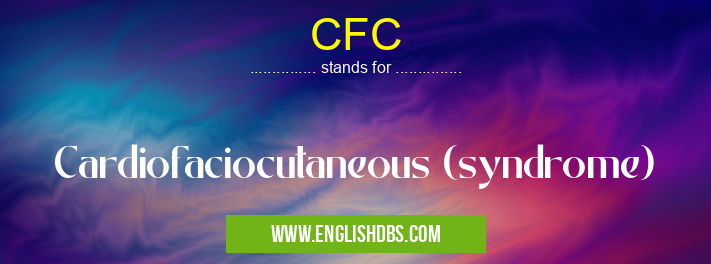What does CFC mean in SYNDROMES
Cardiofaciocutaneous (CFC) is a rare genetic disorder that affects multiple body systems and can cause growth delays, intellectual disability, heart defects, skin changes, and other medical problems. It is caused by mutations in various genes that lead to abnormal development of the heart, face, and skin. CFC is an abbreviation used to describe this collection of symptoms in individuals affected by the syndrome.

CFC meaning in Syndromes in Medical
CFC mostly used in an acronym Syndromes in Category Medical that means Cardiofaciocutaneous (syndrome)
Shorthand: CFC,
Full Form: Cardiofaciocutaneous (syndrome)
For more information of "Cardiofaciocutaneous (syndrome)", see the section below.
Symptoms
Affected individuals typically have characteristic facial features including wide eye openings (hypertelorism), drooping eyelids (ptosis), low-set ears with a prominent upper helix, and a small nose with a broad nasal tip as well as broad mouth. They may also have sparse scalp hair or eyebrows. Cardiac findings can include atrial septal defect (ASD), ventricular septal defect (VSD), pulmonary artery stenosis, and patent ductus arteriosus (PDA). Growth delay or short stature is common in CFC patients due to incomplete development of bones and muscle tissue which can be manifested as hypotonia or sporadic episodes of hypoglycemia. Additionally, there may be a history of recurrent infections caused by immunodeficiency affecting the respiratory system or other organs.
Diagnosis & Treatment
Since CFC is such a rare condition, it can be difficult to diagnose accurately without genetic testing. A multidisciplinary approach involving doctors from numerous fields including cardiology, dermatology, gastroenterology and genetics is necessary for accurate diagnosis and treatment planning. Treatment includes management of secondary medical problems associated with CFC as well as physical therapy to help improve muscle tone and balance difficulties. There are currently no cures available for CFC but therapies aimed at alleviating specific symptoms are available on an individual basis depending on the individual’s needs.
Essential Questions and Answers on Cardiofaciocutaneous (syndrome) in "MEDICAL»SYNDROMES"
What is Cardiofaciocutaneous (CFC) Syndrome?
Cardiofaciocutaneous (CFC) Syndrome is a rare genetic disorder caused by mutations in two key genes called BRAF and MEK1. It affects multiple organ systems in the body, including the heart, skin, immune system and brain. Symptoms may include facial dysmorphism, cardiac abnormalities, growth delay, intellectual disability, cutaneous findings, hearing loss or eye abnormalities.
How common is CFC Syndrome?
CFC Syndrome is estimated to be present in fewer than 1 in 100 thousand births. It occurs equally throughout all racial and ethnic groups.
What are the key features of this syndrome?
The key features of CFC Syndrome are facial dysmorphism, cardiac abnormalities such as hypertrophic cardiomyopathy or conduction disturbances; growth delay; mild to severe intellectual disability; cutaneous findings including cafe-au-lait spots; hearing loss or eye abnormalities such as myopia or strabismus.
How is CFC Syndrome diagnosed?
Diagnosis of CFC Syndrome requires a significant number of clinical features and laboratory tests that include genetic testing for the two key genes responsible for the syndrome (BRAF and MEK1) as well as imaging studies like electrocardiogram (ECG) and echocardiogram to assess any cardiac abnormality.
Is there a way to treat this syndrome?
There is currently no cure for CFC Syndrome but treatment focuses on managing symptoms such as helping with speech therapy to improve communication skills and physical therapy for motor delays or specific therapies like occupational therapy to help improve hand-eye coordination. Additionally medications can be prescribed with the goal of decreasing symptoms associated with neurological impairment or addressing other comorbidities such as seizures.
What should people with this condition look out for when it comes to safety issues?
People suffering from CFC Syndrome should be monitored closely because they may have significant cardiovascular complications due to their underlying condition that could warrant prompt medical intervention including arrhythmogenic events like atrial fibrillation or ventricular tachycardia which can result in syncope or sudden death if not treated promptly. Additionally they may also have difficulty recognizing danger and making safe decisions due to their cognitive impairment so guardians need keep an extra eye on them in any activity that involves risk.
Are there any support organizations devoted specifically to people who have been diagnosed with this condition?
Yes, there are several support organizations providing education about CFC Syndrome and connecting individuals affected by this rare disorder like “Cardiofaciocutaneous Global Foundation” and “Cardiofaciocutaneous Support Group International” among others. You can find more information about these resources online on their websites.
Final Words:
Cardiofaciocutaneous (CFC) syndrome is a rare genetic disorder that causes multiple health issues in affected individuals ranging from facial features to cardiac problems to growth delays or short stature. Diagnosis often requires genetic testing due to its rarity while treatments are based on individual needs since there are no cures available yet for this syndrome. Knowing all you can about CFC will help you navigate the challenges that come with living with this condition carefreely.
CFC also stands for: |
|
| All stands for CFC |
